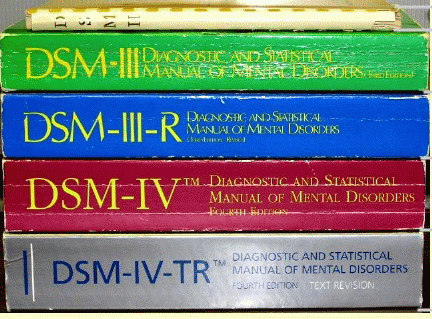While the most recent changes to the DSM have been extensively discussed and researched, many of the revisions have been received critically, and the APA has moved rapidly to stymy criticism of DSM-5 by convening a new Task Force that has already reported on some further significant changes to mental health diagnostic criteria that will refine and elaborate on the changes in DSM-5.
The APA has recently confirmed that "Many of the revisions in DSM-5 will help psychiatry better resemble the rest of medicine", but now the aim of DSM-6 is to align psychiatric diagnosis with car maintenance. This will move diagnosis and treatment away from airy-fairy, psychological concepts such as ‘recovery’ to the more practical notion of fixing something that is clearly broken. Pursuing the ‘car maintenance’ analogy, DSM-6 will recommend that everyone should have an annual “road test” to ensure that their mental health is fit for purpose. Failing the test (e.g. by reporting the experience of at least one negative emotion in the previous 12 months) will require compulsory medication for a period to be determined by a panel of experts recruited from salesmen within the pharmaceutical industry.
Other new changes within DSM-6 include:
1. An increased number and range of prodromal risk factors for mental health problems. These include dementia compulsio – forgetting whether you’ve locked the door and returning to check; risum cacoethes – uncontrollable inappropriate giggling fits – a known risk factor for a number of diagnosable disorders such as delirium, mania and bipolar disorder; anxietatem dentalis - feeling anxious when reading magazines you’ve previously encountered in your dentist’s waiting room, a precursor for a range of irrational fears.
2. Nose-picking disorder is recognized as a new independent disorder category, along with Gluttony (formerly known as Binge Eating Disorder), and Jealousy (a former sub-type of Borderline Personality Disorder).
3. The ‘scorn exclusion’ has been removed from the diagnosis of Antisocial Personality Disorder. This allows scorn (or contempt) to be included as a contributor to a diagnosis of Antisocial Personality Disorder.
4. All criteria for major Depression have been removed and replaced by the single cardinal feature of ‘low mood’. This will allow GPs and physicians to prescribe antidepressants on the basis of an immediate diagnosis rather than – as before – a financial inducement from a pharmaceutical industry rep.
5. DSM Criticism syndrome is a new psychosis sub-type characterized by delusional beliefs that DSM is not a necessary requirement for helping people to recover from mental health problems and merely provides labels that stigmatize sufferers. People diagnosed with this disorder should not be approached directly because of their revisionist and anti-establishment views. The APA has set a target date of 2020 for the total eradication of this particularly virulent illness.
You can find a much fuller summary of the recommendations for DSM-6 here. When published, DSM-6 is expected to cost in the region of $45,000 a copy.

 RSS Feed
RSS Feed